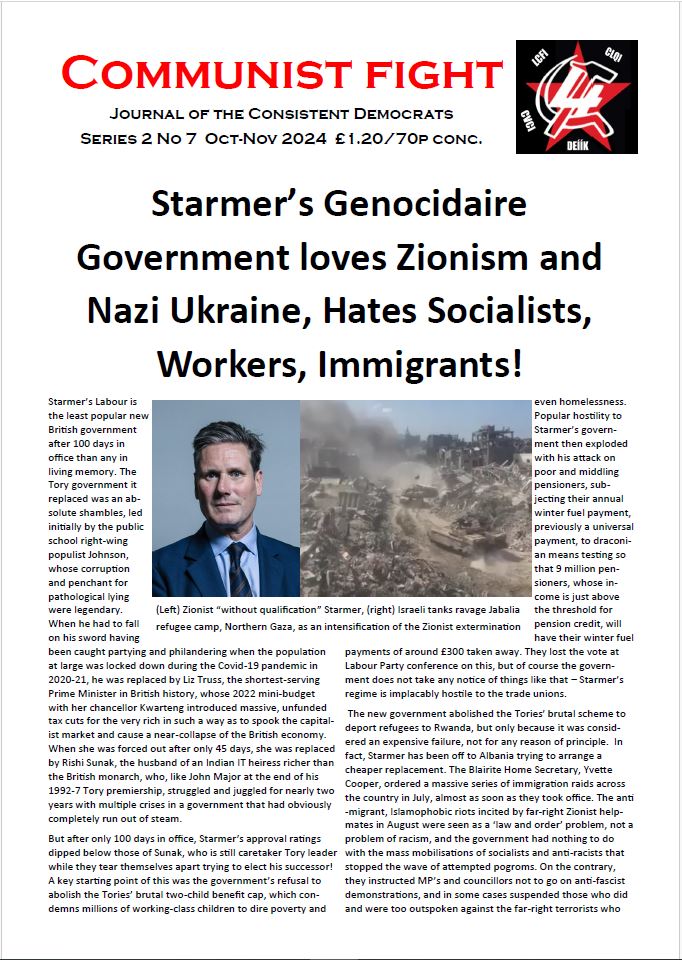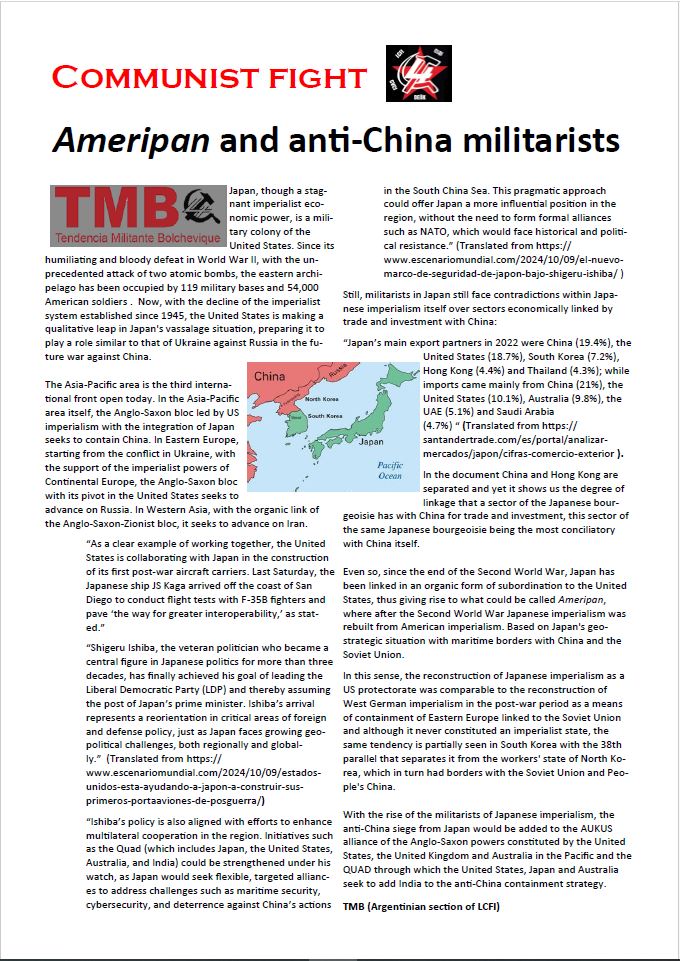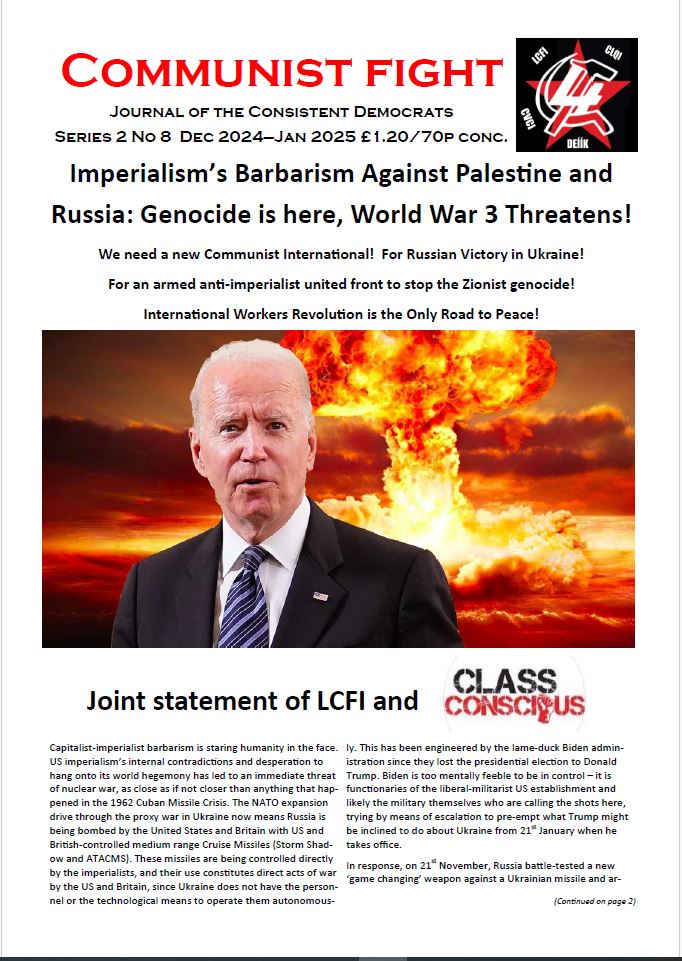
This issue contains material dealing with crucial domestic and international issues, and wider programmatic issues confronting Marxist politics today. We have two articles that together address in some detail the rapid collapse in popular support for Starmer’s government, its continuation of attacks on the working-class population, including immigrant workers, and its continuation of Tory austerity. But it is the international dimension of its crimes that attract most attention – its support for Zionist genocide and US-backed Nazi terrorism in Ukraine, among others. Labour’s election was clearly not in any sense a class vote – on the contrary, those in charge of Labour now are the political assassins of any and all manifestations of working-class opposition to neoliberalism and capitalism.
It includes a joint statement from the LCFI and ClassConscious (US and Australia) on the assassination of Nasrallah and the bloodthirsty attack by Israel on Lebanon, together with wider imperialist backing for that. The article on the back page, by our comrades in the Argentinian Militant Bolshevik Tendency (TMB) addresses Japan becoming an overt part of the US war drive against China, associated with AUKUS, in the Far East.

But the most substantial article in the journal is part 1 of a 3-part series that will also be continued in the next two issues. This is our extensive letter to the International Communist League (Fourth Internationalist), who we dub as the “New Spartacists”. This tendency has undergone major political changes since the death of their founder and long time leading figure, James Robertson, in 2019. They have retrospectively changed their position on the Middle East, renouncing every position on this that was associated with their tendency throughout its history. Whereas the old Spartacists were historically initially sympathetic to the Zionist conquest of Palestine, retrospectively taking a position of support for Israel in 1948, and only later modifying their position to one that professed ‘revolutionary defeatism’ on both sides, the New Spartacists have denounced this pro-Zionism and neutrality going back to the birth of their tendency and earlier.
We consider this to be a profoundly correct change of position, which parallels an analysis that we made of their evolution several years ago. They have also re-embraced the revolutionary Communist-Trotskyist position of the Anti-Imperialist United Front, as integral to the programme of Permanent Revolution in the colonial and semi-colonial world, as laid out at the Second and Fourth Congresses of the Communist International in 1920-22. The earlier Spartacists had engaged in sophistry and attempted to separate Permanent Revolution from the AIUF, which they renounced in theory as akin to Stalinist betrayal of independent class politics. This was at bottom a chauvinist position, that rationalised refusing to involve themselves in trying as Marxists to lead the struggles of oppressed people from a class perspective.
There is too much material in this letter to attempt to recapitulate here. But this instalment also includes a political explanation for the cultist practices that often characterised the Spartacists in recent decades. And it lays out an analysis of how the contradiction between Lenin’s theory of the ‘Democratic Dictatorship of the Proletariat and Peasantry’ and Trotsky’s ‘Permanent Revolution’ played out in the pre-revolutionary period, and how a synthesis was produced that was able to lead the proletarian revolution to victory in 1917. This is relevant because of controversies surrounding orthodox Trotskyism and how revolutionary movements come into being that have proved problematic in later attempts to build revolutionary Marxist organisations. The letter also touches on the question of ‘interpenetrated peoples’ and the old Spartacists incorrect understanding of the national question in Ireland.
Future instalments will deal with the contradictions of the old and new Spartacists on imperialist separatism against the European Union, on tailing imperialist nationalism and right-wing populism, as they did over Brexit and indeed over Covid. And later the letter addresses their contradictions in dealing with the legacy of their political predecessors over defence of the Soviet Union, Poland’s pro-capitalist/neo-liberal trade union movement, which became of the vanguard of capitalist restoration in Eastern Europe and the USSR, and now the post-Soviet Cold War being waged by the West against Russia and China, where the new Spartacists seem to be repeating the neutrality of the old Spartacists over Argentina, Zionism and Ireland, in the new context of imperialism’s proxy war against Russia via Ukraine.
Future instalments deal with all these issues in depth.

